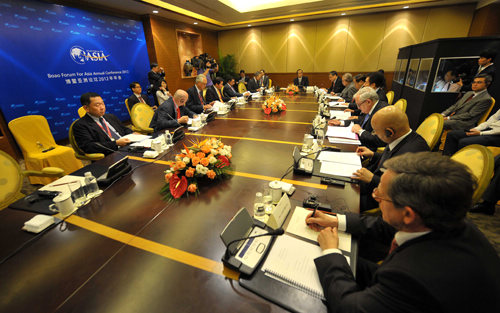|
 |
|
ANNUAL EVENT: The Board of Directors Meeting of the Boao Forum for Asia Annual Conference 2012 was held on March 31 to make preparations for the three-day event (GUO CHENG) |
The Boao Forum for Asia (BFA) Annual Conference 2012, an economic forum attended by regional senior officials, economists and business people, was held in Hainan's coastal resort town of Boao on April 1-3. Zhang Yansheng, Director of the Institute for International Economics Research of the National Development and Reform Commission, talked to Beijing Review reporter Yu Lintao in an exclusive interview before the opening of the BFA, sharing his views on the world economy, emerging Asian economies and China's economic issues. Edited excerpts follow:
Beijing Review: What's the significance of the BFA? Compared with Davos World Economic Forum, what kind of role has it played in Asia?
 |
|
(CFP) | Zhang Yansheng: In a general sense, the trend of the world economy is moving eastward to the Asian district. Developed countries are mired in slow or even negative economic growth while emerging economies, Asian countries in particular, have witnessed fast growth, according to a report by the Asian Development Bank.
The 10-year history of the BFA is in line with the economic boom in Asia in the past decade. It has played an active role in uniting Asian countries, exerting the functions of emerging economic powers and letting them shoulder more responsibilities. Moreover, it has effectively pushed forward regional economic cooperation and the economic integration of the continent.
The annual reports that the BFA releases each year, including Asian Competitiveness, Progress of Asian Economic Integration and the Development of Emerging Economies, are based on thorough analysis of Asia's economic development trends and will offer good evidence for all countries in Asia to sustain steady economic development.
Compared with the Davos World Economic Forum, a world-class forum targeted at solving economic issues worldwide, the BFA is focused on the Asian region. Due to expanding influences of the Asian economy, the BFA is playing a bigger and bigger role in the world.
How can Asian countries achieve sound and sustainable development, which is the theme of this year's BFA?
A highly polluting and energy-depleting development mode will eventually cost us a lot. In a bid to realize healthy and sustainable development, Asian countries should improve efficiency of their economic growth, from relying on high input to depending on knowledge, wisdom and innovation. Also, they should reduce their over-dependence on European and U.S. markets, explore emerging markets and expand market demand in Asia.
How do you see today's world economy and the Asian economy?
The world economy has encountered three "lacks": a lack of demand, a lack of confidence and a lack of methods.
To start with, major economic powers in the West are still mired in a sluggish economic recovery four years after the financial crisis in 2008. The economic stimulus methods that the United States, Japan and Europe have opted for are quite worrying, such as the quantitative easing monetary policy and the practice of printing more banknotes. These methods will drive up their domestic inflation and create a capital bubble. Worse still, these methods are likely to let a huge amount of hot money flock to emerging economies and push up their inflation levels. In the end, the global economy will face more severe inflation and bubble risks.
Also, Western countries mainly rely on overseas market demand to stimulate their domestic economies, which will easily result in trade frictions with other countries.
Emerging economies also face numerous difficulties and uncertainty. Some have flawed economic structures and political corruption, while many others are fighting hard against poverty and striving to improve people's lives. They feel an urgent need to transform their economic development patterns by fostering domestic demand. Rubbing salt into those wounds is the drop of global total demand because of the continuous economic downturn in developed countries, which will negatively affect the steady growth of emerging economies.
Asia is experiencing an economic integration period. Some Asian countries, such as China, used to import components from Japan and South Korea, assemble them and then export to the United States and Europe. Given the current international development trend, this should change.
First, Asian countries should expand internal demand. Asia's economic growth should rely on investment, trade and coordination of policies among Asian countries.
Second, we should propel Asian integration to expand cooperation within the region. This requires leading powers to assume their due responsibilities and increase their mutual trust. Asian countries should adopt the principle of seeking common points while preserving differences when dealing with historical problems and bilateral disputes.
Finally, we should study how to accelerate regional technological cooperation to realize a green and low-carbon economy in Asia.
| 